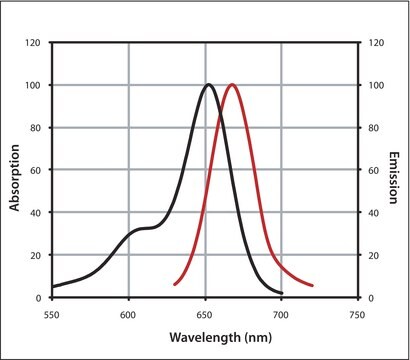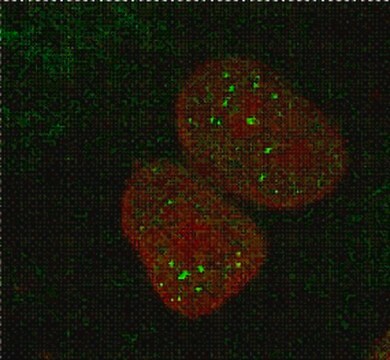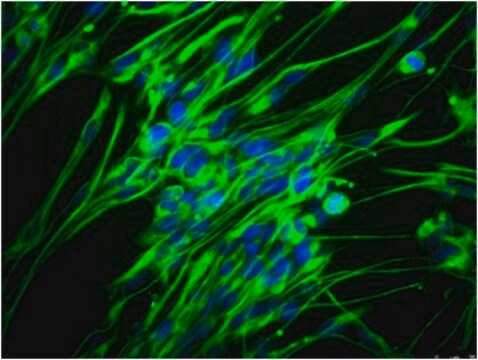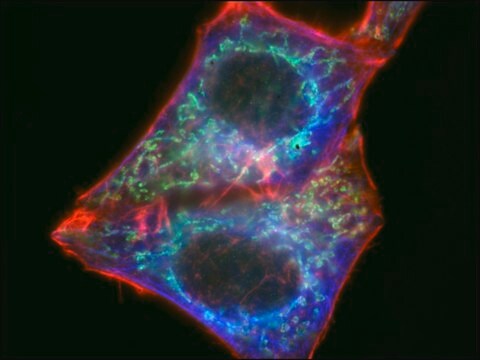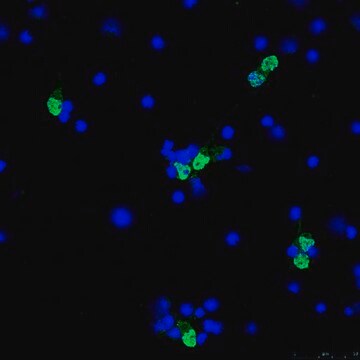推薦產品
生物源
rat
品質等級
共軛
ALEXA FLUOR™ 488
抗體表格
purified antibody
抗體產品種類
primary antibodies
無性繁殖
13A4, monoclonal
物種活性
mouse
應無反應活性
Drosophila, rat, chicken, human
製造商/商標名
Chemicon®
技術
flow cytometry: suitable
輸入
sample type epithelial cells
sample type hematopoietic stem cell(s)
sample type: mouse embryonic stem cell(s)
sample type mesenchymal stem cell(s)
sample type neural stem cell(s)
同型
IgG1κ
NCBI登錄號
UniProt登錄號
運輸包裝
wet ice
目標翻譯後修改
unmodified
基因資訊
chicken ... Prom1(422825)
human ... PROM1(8842)
mouse ... Prom1(19126)
rat ... Prom1(60357)
一般說明
Prominin is a novel plasma membrane protein with an N-terminal extracellular domain, five transmembrane segments flanking two short cytoplasmic loops and two large glycosylated extracellular domains, and a cytoplasmic C-terminal domain. DNA sequences from Caenorhabditis elegans predict the existence of a protein with the same features, suggesting that prominin is conserved between vertebrates and invertebrates. Prominin is found not only in the neuroepithelium but also in various other epithelia of the mouse embryo. In the adult mouse, prominin has been detected in the brain ependymal layer, and in kidney tubules. In these epithelia, prominin is specific to the apical surface, where it is selectively associated with microvilli and microvilli-related structures. Remarkably, upon expression in CHO cells, prominin is preferentially localized to plasma membrane protrusions such as filopodia, lamellipodia, and microspikes. These observations imply that prominin contains information to be targeted to, and/or retained in, plasma membrane protrusions rather than the planar cell surface. Moreover, results show that the mechanisms underlying targeting of membrane proteins to microvilli of epithelial cells and to plasma membrane protrusions of non-epithelial cells are highly related (Weigmann et al., 1997). Also see (http://www.ncbi.nlm.nih.gov/prow/guide/438375806_g.htm) for more information on CD133 and prominin expression.
特異性
Recognizes mouse Prominin-1, a pentaspan transmembrane (5-TM) domain glycoprotein. Immunoblotting of E12 mouse brain and adult mouse kidney using mAb 13A4 showed that prominin has a mean apparent molecular weight of 115 kDa; Deglycosylation of brain and kidney prominin with peptide N-glycosidase F (PNGase F) yielded a 94-kDa band indicating that prominin is N-glycosylated. The additional 88-kDa band seen upon deglycosylation of brain prominin represents a C-terminally truncated form (Weigmann et al., 1997; Maw et al., 2000; Roper I, 2000). Prominin-1 is expressed on primitive cells such as hematopoietic stem and progenitor cells, neural & endothelial stem cells, retina and retinoblastoma, as well as developing epithelium. To date, the function and ligand of Prominin-1 are unknown. This antibody can be used to isolate murine stem cells from brain and bone marrow.
免疫原
Telencephali of ten 12-day-old NMRI mouse embryos (E12, ~1 mg protein), which consist mostly of neuroepithelium, were homogenized in 1 mL PBS, mixed with crushed nitrocellulose filter (1 cm2 in 0.5 mL PBS) as adjuvant, and injected i.p. into a LouXSD rat (Weigmann et al., PNAS 1997).
應用
Immunohistochemistry: 1-15 μg/mL. Suggested fixatives: 2-4% PFA, or methanol -20°C fixation. When fixing cells in culture, incubate sample in 3% PFA for 15-30 min at room temperature. Tissue: perfusion with 2-4% PFA, 1-4 hours postfixation is typical. Traditional formalin fixation is NOT recommended. Permeabilization method: 0.2% saponin or 0.1-0.3% Triton X-100 in PBS. Blocking Buffer: For cells in culture, 0.2% gelatin in PBS; for tissue section, 10% FCS in PBS. Dilution Buffer: For cells in culture, 0.2% gelatin in PBS; for tissue section, 0.2% saponin and 10% FCS in PBS. Incubation Times/Temperature: Overnight at 4°C or 1 hour at 37°C.
Note: This antibody does not work with paraffin-embedded sections.
EM immunohistochemistry: The subcellular localization of the 13A4 antigen in mouse E9-10 neuroepithelial cells and adult kidney proximal tubule cells was investigated by immunogold electron microscopy. Strong labeling was observed over the kidney brush border membrane, where 13A4 immunoreactivity appeared to be concentrated toward the tips of the microvilli. Remarkably, in neuroepithelial cells, whose apical plasma membrane contains fewer microvilli than the kidney brush border, 13A4 immunoreactivity was associated mostly, if not exclusively, with microvilli and plasma membrane protrusions, and was not detected in the planar areas of the apical plasma membrane. Because of this preferential localization, the 13A4 antigen was referred to as ′′prominin′′ (from the Latin word ′′prominere,′′ to stand out, to be prominent) (Weigmann et al., 1997).
Western blotting: 1-5 μg/mL in 0.3% Tween in PBS. Sample preparation: Standard Laemmli (boiled in 2% SDS, 100mM DTT or 5% beta-mercaptoethanol, 60mM Tris-HCL pH 6.8). Preferred Gel percentage: 7.5%. Suggested Blocking Buffer: 3-5% Milk, 0.3% Tween in PBS. Incubation time: 1 hour at room temperature or overnight at 4°C. Recommended control extracts: Positive: Kidney membrane; Negative: liver membranes.
Immunoprecipitation: 10-25 μg/mL. Suggested tissue/cell lysis buffer: RIPA bufferFinal reaction volume: 500-1000 μL. Final total protein concentration in reaction mix: 0.5-3 mg/mL. Incubation times: overnight at 4°C. Capture agent used: Protein G Sepharose™ or rabbit anti-rat antibody/protein A Sepharose. Expected sizes on immunoblots (in kDa): 115 kDa (mature form) or 105 kDa (precursor form).
FACS Analysis: Suggested dilution/number of cells: 0.25-1 μg/ million cells. Fixation/Permeabilization used: BD FACS lysis Solution (1-1.5% formaldehyde) (BD and FACS are trademarks of Becton, Dickinson and Company) No permeabilization. Recommended controls: Hematopoietic stem cells.
Optimal working dilutions must be determined by the end user.
Note: This antibody does not work with paraffin-embedded sections.
EM immunohistochemistry: The subcellular localization of the 13A4 antigen in mouse E9-10 neuroepithelial cells and adult kidney proximal tubule cells was investigated by immunogold electron microscopy. Strong labeling was observed over the kidney brush border membrane, where 13A4 immunoreactivity appeared to be concentrated toward the tips of the microvilli. Remarkably, in neuroepithelial cells, whose apical plasma membrane contains fewer microvilli than the kidney brush border, 13A4 immunoreactivity was associated mostly, if not exclusively, with microvilli and plasma membrane protrusions, and was not detected in the planar areas of the apical plasma membrane. Because of this preferential localization, the 13A4 antigen was referred to as ′′prominin′′ (from the Latin word ′′prominere,′′ to stand out, to be prominent) (Weigmann et al., 1997).
Western blotting: 1-5 μg/mL in 0.3% Tween in PBS. Sample preparation: Standard Laemmli (boiled in 2% SDS, 100mM DTT or 5% beta-mercaptoethanol, 60mM Tris-HCL pH 6.8). Preferred Gel percentage: 7.5%. Suggested Blocking Buffer: 3-5% Milk, 0.3% Tween in PBS. Incubation time: 1 hour at room temperature or overnight at 4°C. Recommended control extracts: Positive: Kidney membrane; Negative: liver membranes.
Immunoprecipitation: 10-25 μg/mL. Suggested tissue/cell lysis buffer: RIPA bufferFinal reaction volume: 500-1000 μL. Final total protein concentration in reaction mix: 0.5-3 mg/mL. Incubation times: overnight at 4°C. Capture agent used: Protein G Sepharose™ or rabbit anti-rat antibody/protein A Sepharose. Expected sizes on immunoblots (in kDa): 115 kDa (mature form) or 105 kDa (precursor form).
FACS Analysis: Suggested dilution/number of cells: 0.25-1 μg/ million cells. Fixation/Permeabilization used: BD FACS lysis Solution (1-1.5% formaldehyde) (BD and FACS are trademarks of Becton, Dickinson and Company) No permeabilization. Recommended controls: Hematopoietic stem cells.
Optimal working dilutions must be determined by the end user.
Anti-CD133 Antibody, clone 13A4, Alexa Fluor 488 conjugated is an antibody against CD133 for use in FC.
Research Category
Stem Cell Research
Stem Cell Research
Research Sub Category
Neural Stem Cells
Hematopoietic Stem Cells
Neural Stem Cells
Hematopoietic Stem Cells
外觀
Protein A purified
Liquid in Phosphate buffer with 15 mg/mL BSA as a stabilizer and 0.1% sodium azide.
儲存和穩定性
Maintain refrigerated at 2–8°C protected from light in undiluted aliquots for up to 24 months.
分析報告
Control
Human embryonic stem cell lysate, Caco 2 (Human colonic carcinoma cell line) whole cell lysate
Human embryonic stem cell lysate, Caco 2 (Human colonic carcinoma cell line) whole cell lysate
其他說明
Concentration: Please refer to the Certificate of Analysis for the lot-specific concentration.
法律資訊
ALEXA FLUOR is a trademark of Life Technologies
CHEMICON is a registered trademark of Merck KGaA, Darmstadt, Germany
Sepharose is a trademark of Cytiva
免責聲明
Alexa Fluor™ is a registered trademark of Molecular Probes, Inc.
Unless otherwise stated in our catalog or other company documentation accompanying the product(s), our products are intended for research use only and are not to be used for any other purpose, which includes but is not limited to, unauthorized commercial uses, in vitro diagnostic uses, ex vivo or in vivo therapeutic uses or any type of consumption or application to humans or animals.
Unless otherwise stated in our catalog or other company documentation accompanying the product(s), our products are intended for research use only and are not to be used for any other purpose, which includes but is not limited to, unauthorized commercial uses, in vitro diagnostic uses, ex vivo or in vivo therapeutic uses or any type of consumption or application to humans or animals.
未找到適合的產品?
試用我們的產品選擇工具.
儲存類別代碼
12 - Non Combustible Liquids
水污染物質分類(WGK)
WGK 2
閃點(°F)
Not applicable
閃點(°C)
Not applicable
分析證明 (COA)
輸入產品批次/批號來搜索 分析證明 (COA)。在產品’s標籤上找到批次和批號,寫有 ‘Lot’或‘Batch’.。
D Corbeil et al.
The Journal of biological chemistry, 275(8), 5512-5520 (2000-02-22)
The human AC133 antigen and mouse prominin are structurally related plasma membrane proteins. However, their tissue distribution is distinct, with the AC133 antigen being found on hematopoietic stem and progenitor cells and prominin on various epithelial cells. To determine whether
D Corbeil et al.
Journal of cell science, 112 ( Pt 7), 1023-1033 (1999-04-13)
Prominin is a recently identified polytopic membrane protein expressed in various epithelial cells, where it is selectively associated with microvilli. When expressed in non-epithelial cells, prominin is enriched in plasma membrane protrusions. This raises the question of whether the selective
K Sawamoto et al.
The Journal of neuroscience : the official journal of the Society for Neuroscience, 21(11), 3895-3903 (2001-05-23)
Mesencephalic precursor cells may one day provide dopaminergic neurons for the treatment of Parkinson's disease. However, the generation of dopaminergic neurons from mesencephalic precursors has been difficult to follow, partly because an appropriate means for recognizing mesencephalic ventricular zone precursors
Christine A Fargeas et al.
Journal of cell science, 117(Pt 18), 4301-4311 (2004-08-19)
Prominin-1/CD133 is a five-membrane-span glycoprotein that is thought to act as an organizer of plasma-membrane protrusions. Here, we report the molecular and cell-biological characterization of four novel prominin-1 splice variants isolated from a mouse testis cDNA library and referred to
K Röper et al.
Nature cell biology, 2(9), 582-592 (2000-09-12)
Membrane cholesterol-sphingolipid 'rafts', which are characterized by their insolubility in the non-ionic detergent Triton X-100 in the cold, have been implicated in the sorting of certain membrane proteins, such as placental alkaline phosphatase (PLAP), to the apical plasma membrane domain
我們的科學家團隊在所有研究領域都有豐富的經驗,包括生命科學、材料科學、化學合成、色譜、分析等.
聯絡技術服務
